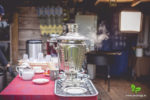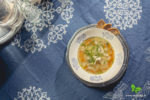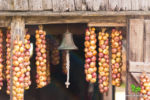ONIONS, FISH AND CHICORY – THE LOCAL FOOD ROUTE
GENERAL INFORMATION
Package type: full day
Season: January–December / seasonal
For whom: groups (min. 4–max. 40 pers.)
Services included: local food tasting, handicrafts and visits to local people, local guide. NB! The choice of venues depends on the wishes and size of the group. 7 options for visits are described below, out of which timing allows for 4–5 in one day. The particular programme shall be agreed in advance.
Duration of the programme: 6–8 hours
Type of transport: individual transfer / tour bus
LOCATION: The Onion Route area, the southern coast of Lake Peipsi
Distance from the capital: Tallinn 219 km
Contact person: Liis Lainemäe, MTÜ Sibulatee (NGO Onion Route)
Contact details:
T.: +372 5648 0065
E-mail: info@sibulatee.ee
The guide Liis Lainemäe has been developing and marketing the area for almost 12 years, starting with the birth of the Onion Road. She knows the joys and sorrows of all the service providers and tells the stories about the area, about sights and folk-art objects along the way.
The programme includes visits to Russian Old Believers communities along the Kolkja–Kasepää–Varnja road, which runs through the villages by Lake Peipsi. The location is 40 km from Tartu, the second largest city in Estonia. Guests will visit local people, see local life, get to know the different cultures and, especially, the most important role played by local food. Every place visited will offer a taste of some local specialty.
- Tea drinking ceremony in Samovarimaja (Samovar House). The morning begins with a tea drinking ceremony at the Samovar House located in a tidy old wooden building which exhibits an extensive collection of samovars. A samovar is a device traditionally used to heat and boil water for tea. The Samovar House hostess talks about the history of samovars and the tea culture of the area.
- Meeting the owners of Voronja Galerii (Voronja Gallery). During summer, the Voronja Gallery is one of the most popular places in the region. Each year there is a new themed summer exhibition, often created by international artists and displayed in the house, in the sauna and in the large yard which is turned into a sculpture park. A real highlight of the visit is the Voronja cardamon wafers and rhubarb wine served to guests. Delicious home-made jams are available to buy.
- Kostja Sibulatalu (Kostja Onion Farm). Open May–September. Kostja, the owner of an onion farm, shows and talks about how the Old Believers grow onions near Lake Peipsi. Guests will taste Kostja’s onion pies and drink tea. In spring, guests can try out making a bed for growing onions in the same traditional way as it was in the past.
- Turgi Käsitöötalu (Turgi handicraft farm) – a traditional Estonian weaving farm. The hostess Veinika introduces Estonian farming from between the two world wars and talks about how it is possible to make a living by producing handicrafts in the countryside. Guests can try their hand at weaving on the looms.
- Peipsimaa Külastuskeskus (Peipsimaa Visitor Centre). The Peipsimaa Visitor Centre in Kolkja preserves and exhibits local handicraft traditions and offers handicraft workshops. Guests will take part in a handicraft workshop and make, for example, a new shopping bag using traditional hand-printing techniques. The centre also houses a lubok yard (a lubok is a hand-painted print on a piece of wood) and a chicory museum. Chicory has, historically, been an important plant for the region, being extensively cultivated and exported. Guests can enjoy chicory coffee and cake, order traditional onion soup and/or fish steak for lunch.
- Alatskivi Loss (Alatskivi Castle). The Baltic German manor culture is another important one in the region and is well represented by Alatskivi Castle. On a guided tour guests can get an overview of the history of Estonian manors, find out how they functioned economically, and enjoy tasting local manorial style snacks.
- Local winery Alatskivi Mõisamaitsed (Alatskivi Manor Tastes). Estonia has a long tradition of making artisan wines, and in Alatskivi Castle the baroness was a maker of bitter schnapps: it was necessary at the time to have more exciting tastes such as homemade schnapps to add to other manor dishes. Today, winemaker Külli, Alatskivi Mõisamaitsed (Alatskivi Manor Tastes), makes a variety of wines from local ingredients (blackcurrant, cherry, rowan, etc.) and even honey wine such as Viking Blood is on Külli’s wine shelf. Külli will share her experience of making wines from Estonian ingredients and offer some for tasting.
- Kivi Kõrts (Kivi Tavern). In Kivi Tavern, most of the food is locally sourced – from the lakes, the forests and the fields. The hostess Aigne is fond of gathering wild berries and mushrooms and the harvest often finds its way to guest’s plates.






